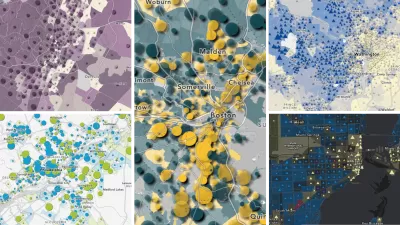According to the 2000 Census, the City of Lowell, Massachussetts has 105,000 people. Mayor Edward "Bud" Caulfield says they were wrong, and is doing everything he can to make the 2010 numbers accurate.
"If we don't make an accurate count we are only hurting ourselves," Caulfield said.
Census figures are used by the government to award $300 billion in money to states, cities and towns every year. Additionally, the number of seats each state holds in the U.S. House of Representatives is based on Census numbers. Early projections show that Massachusetts is poised to lose one of its 10 seats in the House.
"We don't want to lose the Fifth Congressional District," Caulfield added.
Yesterday morning, U.S. Census Bureau and city officials met at City Hall with business, religious, and community leaders to explain the process and importance of the Census and how they can assist."
FULL STORY: City wants recount on Census

Planetizen Federal Action Tracker
A weekly monitor of how Trump’s orders and actions are impacting planners and planning in America.

Maui's Vacation Rental Debate Turns Ugly
Verbal attacks, misinformation campaigns and fistfights plague a high-stakes debate to convert thousands of vacation rentals into long-term housing.

San Francisco Suspends Traffic Calming Amidst Record Deaths
Citing “a challenging fiscal landscape,” the city will cease the program on the heels of 42 traffic deaths, including 24 pedestrians.

Amtrak Rolls Out New Orleans to Alabama “Mardi Gras” Train
The new service will operate morning and evening departures between Mobile and New Orleans.

The Subversive Car-Free Guide to Trump's Great American Road Trip
Car-free ways to access Chicagoland’s best tourist attractions.

San Antonio and Austin are Fusing Into one Massive Megaregion
The region spanning the two central Texas cities is growing fast, posing challenges for local infrastructure and water supplies.
Urban Design for Planners 1: Software Tools
This six-course series explores essential urban design concepts using open source software and equips planners with the tools they need to participate fully in the urban design process.
Planning for Universal Design
Learn the tools for implementing Universal Design in planning regulations.
Heyer Gruel & Associates PA
JM Goldson LLC
Custer County Colorado
City of Camden Redevelopment Agency
City of Astoria
Transportation Research & Education Center (TREC) at Portland State University
Jefferson Parish Government
Camden Redevelopment Agency
City of Claremont





























